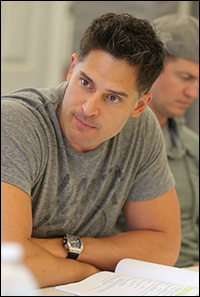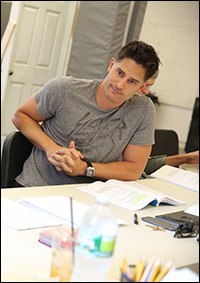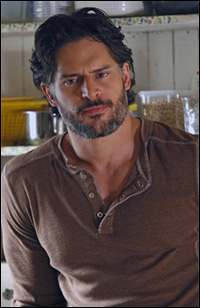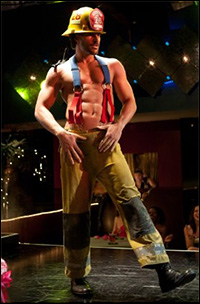
Manganiello was first introduced to "True Blood" fans during season three of the hit series. Since then, he has quickly become a fan favorite, captivating viewers as the pack master werewolf with his frequently shirtless scenes. At 6'5", Manganiello's impressive physique has played a huge role in his success. He starred as Big Dick Richie in the 2012 film "Magic Mike" and, most recently, wrote a book sharing his passion for fitness – "Evolution: The Cutting Edge Guide to Breaking Down Mental Walls and Building the Body You've Always Wanted" (out Dec. 3). But, the trained actor, with a BFA from Carnegie Mellon, is eager to return to his other passion, theatre.
Manganiello visited Playbill.com and spoke with Tori Scott about his excitement around returning to the stage, his strong connection to the role of Stanley, and life after "True Blood."
"True Blood" has been such an incredible success for you. Now that it has been announced that the show is ending next season, are you eager and ready to move on to other projects or will this ending be bittersweet?
Joe Manganiello: It's mixed. I just have so much love in my heart for the character that I get to play. I am forever grateful to the show for the opportunities it opened up. It changed my life and gave me the opportunity to write a book, start a company and direct a documentary. And to be able to do Streetcar. I haven't been able to be a part of the New York theatre scene or get out there and do a play. I hadn't been able to do a play in four years. To be able to have the freedom to make the choice to be able to do the types of things that I want to do, I owe that all to the show. It's going to be sad saying goodbye to those people, but with that said, there is an incredible amount of excitement for me because the show giveth and it also tooketh away. [Laughs.] It opened all these doors for me that I hadn't been able to walk through.
That's a very lucky place to be as an actor.
JM: Oh yeah, it's amazing. But you kind of get to critical mass at some point and you go, "I really, really wanna get out there." I was just itching to get back on stage, and there are all of these characters I'm itching to play. So, whether or not the fairy winds up with the werewolf in the end, I'm sure everyone has strong opinions on what they want to happen, but I don't know what I have to look forward to as far as storyline goes with "True Blood" this year. I don't know what part I'm going to play in the end game, but I'm incredibly excited about getting out and especially being in New York and doing a play and thinking, "I could be back here doing Broadway," possibly as early as a year from now.
| |
 |
|
| Manganiello in rehearsal for Streetcar. | ||
| photo by Joan Marcus |
JM: [Laughs.] I'm going to hold out, and I'm not going to give an answer until I know what his musical number is. I want to know what his song is. You want a big 11 o'clock number?
JM: Yeah, something with dancing penis pumps. I mean you could really do some fun things. Oh, and firemen!
Tell me about playing Stanley in Streetcar Named Desire. This is a role you played before about five years ago, correct?
JM: Yeah, I did it five years ago, but I actually did it 10 or 11 years before that in college.
Since this is a role you've visited three times in your life, what keeps bringing you back to him?
JM: We just keep finding each other. These opportunities come up. In college, the senior directors project was to direct scenes from Streetcar, and I think it was all but two of the directors picked me to be their Stanley. So, I wound up doing almost the whole play for all these different, various directors. So, that found me. Then there was another director who wanted to direct the whole play and so I prepped for that, then didn't wind up doing it. Nine years later, a director from CMU called me up and said, "I'm going to do this in West Virginia, can you come do it." I said, "Great." Played him in West Virginia. Then, five years later, my manager calls me and says, "Hey, they're doing it at Yale." But it is, obviously, very different from when I first played him 16 years ago. It's a very different perspective. But this time around, even from five years ago, the perspective is very different.
| |
 |
|
| Manganiello in rehearsal | ||
| Photo by Joan Marcus |
JM: The first time I did it, when I was young, I was still very much a heavy drinker. Stanley being an active alchoholic with a lot of rage issues. There's a certain amount of it that was... You know, one of my professors at CMU used to say, "It's theatre, not therapy." And I think there was probably some of it at that age. I was going home as the character and it was very close. I was in it! Then, of course, this time around I have a lot of perspective. I have 11 years of not drinking to look at it and understand what the mechanics and inner workings of a person like that is because of the discoveries I've made. Michael Chekhov used to say that if you want to work on your craft, you work on yourself. And so I think this time around I'm not as stuck in it. I think because of that, the first time I read the play to get ready for this, the thing that really struck me was how bad I felt for Blanche and how much empathy I had for her character. Which, I think the other times I played him, I didn't have. It was more like being this immovable object or this unstoppable force and I just saw him as that – just someone who is fighting for what he wants at all costs. Whereas the Stanley I am playing this time, there is much more love for his wife, and I think that's the real driving force in it. And, maybe that just comes with maturity. It's him protecting what he loves and he loves his wife, he just has these severe handicaps in dealing with other people.
Is there a certain quality in Stanley or maybe in how he's written that really draws you into the role each time?
JM: I think what's most interesting is with Tennessee Williams and what we know about him and who he was. He had this fascination with the idea of this "man's man," or whatever that meant. That macho, masculine man shows up in his plays all the time. I did a stage reading of Small Craft Warnings with [William H.] Macy last year at this company called the Hero Theatre Company in LA. It was one of Tennessee's last plays, and there was this washed-up drunken Stanley character. You see that kind of character over and over again in his writing. I think what's interesting is that he wrote this play in 1947, and now here we are 40 odd years into the post-feminist era, and I think playing a man of that archetype is very interesting now. Because there are parts of it where you can see how men without therapy, men without support groups, men without any sort of spirituality, got a very bad name for men. There is this interesting merging of this sort of animal attraction with him and Stella. With the perspective that I have from stuff that I've gone through, you read it and you cringe. You know what he's doing and it's so brilliantly written – and even with it being written years ago – you still know these people. I know Stella and I know Stanley.
| |
 |
|
| Manganiello on "True Blood." | ||
| HBO |
JM: Sometimes you think, "Holy crap, man. How am I supposed to play any of that?" But, I love it! A really good friend of mine, who was actually instrumental in saving my life from the drinking – this was a little old man in a tweed coat – he was approaching 80 and he helped me quit drinking and just deal with life after drinking. He became like my grandfather, and he knew Tennessee Williams. He would tell me stories about Tennessee and man, I wish I could have met him, because I think we would have gotten along really well. [Laughs.] I love those stage directions. They're funny and so great. They are like little clues that he left from the grave!
It's something so simple, like for example, a couple weeks ago I was watching the Discovery Channel and a lion documentary came on. And the male lions sleep 20 hours a day. Female lions go out and hunt and kill this zebra. And then the male lion wakes up and comes running in and just backs all the females out of the way and just starts eating! To which, my girlfriend says, "What the hell?" We can't believe it and I laugh, but we keep watching. All of a sudden this rogue male comes in and starts prowling their group. And what he's looking to do is to kill the cubs to put the female lions in heat, then kill the head male lion and take over. The male lion's job in the four hours that he's awake is to eat, get up and fight these other male lions to keep the cubs from getting killed.
And I thought, "Well, okay, that's an important job!" [Laughs.] And there is something like that in Stanley. Tennessee writes all these stage directions about the jungle and jungle noises and describes Stanley as being an ape. But I think of him more as the male lion. Mitch is that male that isn't allowed in, and Blanche has come from this white columned plantation house in Mississippi. She has come into the jungle and she is ill prepared. And he's not having it. But, at the same time, I think there are moments that I have found, especially this time around, where he has this little boy in him still that is incredibly lovable as well. There are moments with Stella where he just doesn't want her to leave. It's a fascinating play.
| |
 |
|
| Manganiello in "Magic Mike." | ||
| Photo by Glen Wilson – © 2012 Warner Bros. Entertainment Inc. |
JM: It's so different. I watched his version when I first wanted to become an actor, when I knew I was heading in that direction in my teens, I watched "Streetcar." I love Brando and James Dean and all those guys. And then, I didn't watch it again until after I did the show in West Virginia. I respect Brando incredibly because he was punk rock. He was really this rebel who was fighting, just raging against the machine that was this presentational theatrical acting style. It used to be very stuffy, and real people just didn't act like that. So he was the first one to really turn his back to the camera and do his mumbling. And it was so important at the time and it needed to be done. Somebody needed to rebel against it and it just happened to be him, in my opinion, in this role that really changed things and altered the course. So, I'm not constricted by that anymore. I'm free to just play the play, and I'm free to play those moments. I think the people who are familiar with his version have an opinion about it and I don't necessarily know that they've really ever heard the play. I look forward to those people coming to see the play because I think they will probably go, "Wait a minute, is this the same thing I saw?" Because it is so different. There are so many more moments. I mean, Stanley can really be funny at times. He's funny and he's heartbreaking and he's vicious, and there are just so many layers to him. But I think really what Brando had to do at the time was just to tear it all down. But you know, it's mine now. I think the fact that over 16 years I just keep meeting up with this play, I mean at some point I will get too old to play the role, so I don't know if it's this last time I get to do it or not but, the fact is, it's mine. Someone asked me recently, "Have you seen any of the other versions?" Honestly, outside of "The Simpsons," I haven't. I think because there is an amount of it for me where it's MY play.
This is really very personal for you.
JM: Yeah. It's my play. And I belong to it. So you know, I don't really want to see somebody else having sex with my wife. [Laughs.]
You mentioned the idea of Broadway earlier. What are some other roles or other playwrights that interest you?
JM: Always been a huge fan of David Mamet. I just love the language. The first play I ever did in college was a collection of scenes from the "Goldberg Street" collection. It was really difficult material, really dense and you could just rehearse the shit out of that all day every day and get to opening night and still not feel ready. But then, when you get into the performance, it's so freeing because the language is so natural. I'd love to do some Mamet. You know, maybe a run of Speed the Plow where I stay away from sushi. [Laughs.] Or even Ricky Roma in Glengarry Glen Ross. I love Neil LaBute. I got to meet him during intermission of Reasons to be Pretty and he said, "You know, there is a great role in this play for you." Also, my teachers at Carnegie would never let me do John Patrick Shanley. So there's a bunch of Shanley plays I want to do… and Terrence McNally. I'm getting to be the age of Chekhov, and I loved working with Moscow Art theatre directors in college and haven't done it since. And I used to do tons of Shakespeare.
You are really ready to get back to the theatre.
JM: Yeah! Just get back into those roles where you can really sit down at the table and work it all out.
With a new school year starting, what are some words of advice you would give to all the incoming acting students?
JM: You never know which one of those styles or which one of those stupid, crazy things they ask you to do is going to stick with you. And sometimes it's the most bizarre stuff on earth. I thought animal projects were the dumbest thing I'd ever done in my life and then come to find out my big break came playing a half man-half animal. I think about the commedia dell'arte chapter that people kind of blew off. And, honestly, I've made a very good career in comedy playing characters like those characters from commedia. I had this teacher from Peru, her name was Victoria Santa Cruz, and she taught us this class called rhythm, which had really nothing to do with acting. It was like, jumping over a sponge to a tabla player in rhythm and not breaking stride. I mean, it was bizarre! But, honestly, there's not a week that's gone by in my life since that I haven't thought about that woman or thought about something she said. I even quote her in my book. You just never know. And I saw kids that came in freshman year who thought they were too cool for school, smartest one in the room, and they got kicked out. They kicked out really talented kids for thinking they had nothing to learn. So, I would just say to be humble, put your head down, learn everything you can because you just never know down the line what you will need to pull out of your bag of tricks. And who knew I would spend ten years in LA not using any of it, and then all of sudden, I'd be using all of it. *
Tori Scott is a performer and writer living in New York City. She frequently performs at Joe's Pub (coming up Oct. 7) and 54 Below. Follow her @ItsToriScott.










